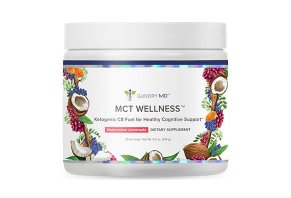Medium-Chain triglyceride (MCT) oil has been gaining popularity as a weight-loss supplement.
MCT Wellness from Gundry MD aims to accomplish this task, in addition to offering other health benefits.
Similar products are often marketed to supplement those on a ketogenic diet, but can anyone use this product?
In this article, we will review the safety, effectiveness, and target audience of this product.
What Is MCT Wellness?
By mixing one scoop of MCT Wellness in 10oz of water each day, this supplement works to boost your metabolism, energy, and mental sharpness by increasing ketone levels.
Gundy MD believes these effects to be possible through a blend of 3 all-natural ingredients.
MCT Wellness Ingredients
MCT Wellness combines caprylic acid, grape seed extract, and currant extract. While the caprylic acid works to quickly boost your ketones, the grape seed and currant extracts increase blood flow to deliver the ketones throughout your body.
goMCT® - 5,000mg
MCTs differ from their long-chain (LCT) counterparts in that they are smaller in structure, allowing for rapid transport to the liver where they can be used as an immediate source of energy.
MCT oil is a compound typically obtained from coconut oil. goMCT® contains 5,000mg of pure caprylic acid, one of the most efficient fuel sources of all MCTs, and is the only patented MCT oil powder on the market.
goMCT for Weight Loss
The caprylic acid found in MCT Wellness may offer weight loss aid through a number of mechanisms.
It was the most ketogenic MCT in a recent study. This effect is thought to be even more meaningful when taken in conjunction with a ketogenic diet as your body preferentially burns fat for energy in the absence of carbohydrates; reduction in blood lipids, body fat, body weight, and favorable effects regarding diabetes have been described.
MCTs are more readily used for energy, whereas LCTs can be easily stored as fat. Consuming 15-30g of MCTs may aid weight reduction by increasing energy expenditure and burning more calories.
It would seem that the energy deficit (calories consumed vs. calories burned) would further benefit weight loss with the addition of regular exercise, though exercise and MCT do not appear to have a cumulative effect.
Dr. Gundry believes true health requires harmony among the many microbes in your body. When this system is thrown off, your immune system, digestion, and overall health may suffer.
MCT promotes gut health and prevents the activation of a gut-derived toxin thought to be associated with obesity, though this connection is more clear in rodent populations than in humans.
Lastly, MCT consumption may result in lower blood sugar and triglyceride levels after meals, as well as a longer sense of fullness through the promotion of leptin and peptide YY, both of which have antiappetite roles. Limiting hunger can also make it easier to adhere to a diet.
The Takeaway Message
MCT may aid weight loss by promoting ketogenesis, enhancing calorie expenditure, improving gut health, and decreasing caloric intake through the promotion of antiappetite hormones. Much of the support is in short-term studies with small sample sizes, though the benefits seem to occur even at doses less than half of what is included in one serving of MCT Wellness.
goMCT for Energy
The effects of MCT on the sympathetic nervous system and calorie expenditure may be related to their ability to boost energy. As MCTs are able to avoid the pathway necessary for LCT metabolism, they are quickly absorbed and offer an instant source of energy.
In addition to a potential method for starting your day, MCT may benefit athletic performance. Athletes who consumed MCT were able to train longer and described lower perception of exertion levels than those that received LCT.
The Takeaway Message
MCTs offer a readily available source of energy that has been shown to increase energy expenditure at doses less than half of what is included in MTC Wellness, and consisting of only 50-60% caprylic acid.
goMCT for Mental Sharpness
As reduced brain glucose has been associated with early Alzheimer’s, alternate sources of energy are thought to have a positive impact. Ketones can cross the blood brain barrier and can offer a source of fuel for your brain in the absence of carbs.
Both high (17,000mg) and low (2,000mg) doses of MCT have been associated with improved cognition, memory, and processing speed in those with mild to moderate Alzheimer’s disease.
The impact on healthy individuals has been studied less extensively, more research is needed to describe the potential benefits in this regard.
The Takeaway Message
MCT supplementation may improve cognitive ability in Alzheimer’s patients. Benefits have been demonstrated at doses more than 5x, as well as half, of what is included in one serving of MTC Wellness. More research is needed to identify benefits in healthy users.
MitoHeal - 400mg and CognigrapeT - 250mg
MitoHeal® and CognigrapeTM are currant and grape seed extracts, respectively. These ingredients support the effects of the caprylic acid component of MCT Wellness. Little is listed on Gundry MD beyond this role.
These extracts seem to carry out their effects through flavonoids, compounds responsible for many of the benefits of fruit and vegetable consumption.
Currant extract may have a variety of potential health benefits related to antioxidant, antimicrobial, anti-inflammatory, and glucose regulatory effects. Additionally, it may promote fat oxidation, especially in endurance athletes.
Vascular effects may be related to associations with nitric oxide, vital for increasing blood flow, though this is based on laboratory research Lastly, cholesterol-lowering effects have been demonstrated in mice and laboratory models.
Grape seed extract may have anti-inflammatory, vascular, and cognitive benefits.
The Takeaway Message
While information regarding the benefits of currant and grape seed extracts is limited on the Gundry MD site, the supportive role of these ingredients may be related to the effects of their flavonoids.
Possible benefits include enhanced fat oxidation, cholesterol reduction, increased blood flow, and cognitive benefits at doses comparable to what is included in MCT Wellness. These effects are supported by both animal and human research, though more long-term studies are required to characterize the effects of chronic use.
Safety
Generally speaking, MCT Wellness is safe. Even at doses greater than 5x what is included in a single serving of MCT Wellness, caprylic acid appears to be safe with little more than an upset stomach, constipation, or diarrhea described.
Though MCT is less likely to be stored as fat when compared to LCT, those with elevated blood lipids may want to avoid this product. High doses in mice still resulted in the favorable effects on body fat, though lipids accumulated in the liver.
Dr. Gundry suggests consulting your primary care physician prior to starting any new program - illustrating the importance to include a medical professional even when the product comes from a credible source.
Who Should Use MCT Wellness?
Gundry MD offers little information on the website in terms of who would benefit from MCT Wellness. As the proposed effects include increased metabolism, energy, and mental sharpness, anyone in need of these effects may benefit from use.
Specifically, evidence supports use for overweight individuals, those that engage in endurance exercise, and those with mild to moderate Alzheimer’s disease. Benefits demonstrated in certain populations do not mean that the same results can be expected in other individuals, however.
These effects appear to be possible regardless of the diet you choose, though as MCT boosts ketones, greater improvements in blood lipids, body fat, and total body weight may be seen when used in conjunction with a ketogenic diet.
Many of these studies include relatively small sample sizes in which subjects were followed for short periods of time. More long-term research is needed to characterize the safety and effectiveness of chronic use of MCT in certain populations.
Pricing
An internet-only deal is currently being offered on Gundry MD’s site.
- 1 Jar: $39.95 (Plus $4.95 Shipping)
- 3 Jars: $109.86
- 6 Jars: $199.70
All orders over $60 come with free shipping.
The sale reflects a 50% reduction from retail pricing, so MCT Wellness is relatively expensive as one jar is a 30 day supply. Dr. Gundry offers a 90-day, full-money-back guarantee if you're not satisfied with this product.
Alternatives
Caprylic acid supplements are offered by other retailers, though pricing, dosage, and method of delivery differ.
GNC offers an organic caprylic acid supplement at a dose 50% larger than what is contained in Gundry’s formulation; it is currently on sale for $23.99. Piping Rock offers their supplement in softgel pill form for just $5.61, though one pill is less than 15% the caprylic acid dose contained in Gundry’s product.
Caprylic acid can also be found naturally in the milk of mammals and coconut oil. Though these can be more cost-effective means of obtaining caprylic acid, 1tbsp of coconut oil has about 20% the amount found in a single serving of Gundry’s product.
Loading up in this manner greatly increases the amount of fat and calories you consume, which may be unsafe with conditions like obesity, diabetes, or heart disease. Additionally, MCT has been demonstrated to be a superior appetite suppressant when compared to coconut oil.
The Bottom Line
MCT Wellness consists of pure caprylic acid, which promotes the formation of ketones to boost metabolism, energy, and mental sharpness. This ingredient is supported by grape seed and currant extracts to help deliver the ketones throughout your body.
The caprylic acid dose in MCT Wellness appears to be safe and effective for overweight individuals and those with Alzheimer’s disease. These effects appear to be possible regardless of your dietary selection, though they may be enhanced when taken in conjunction with a ketogenic diet.
Nonetheless, you should always include a medical professional in the decision to start new supplements.


